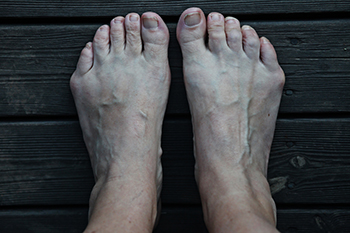
A tailor's bunion, also known as a bunionette, is a bony bump that forms on the outside of the foot near the base of the little toe. Unlike a regular bunion, which occurs on the inner side of the big toe, a tailor's bunion develops from pressure and misalignment of the little toe. The condition often results from wearing tight, narrow shoes or high heels that squeeze the toes, leading to the protrusion. Tailor's bunions can cause discomfort, pain, and difficulty finding well-fitting footwear. The pain may be aggravated by friction or pressure from shoes. Treatment for a tailor's bunion involves wearing wider, more comfortable shoes, using padding to reduce pressure, and potentially wearing orthotics to correct foot alignment. In severe cases, surgery may be necessary to realign the toe and remove the bony bump. If you have a painful tailor’s bunion, it is suggested that you schedule an appointment with a podiatrist for a proper diagnosis and relief options.
If you are suffering from bunion pain, contact Shawn Echard, DPM of Laurel Podiatry LLC. Our practitioner can provide the care you need to keep you pain-free and on your feet.
What Is a Bunion?
Bunions are painful bony bumps that usually develop on the inside of the foot at the joint of the big toe. As the deformity increases over time, it may become painful to walk and wear shoes. Women are more likely to exacerbate existing bunions since they often wear tight, narrow shoes that shift their toes together. Bunion pain can be relieved by wearing wider shoes with enough room for the toes.
Causes
- Genetics – some people inherit feet that are more prone to bunion development
- Inflammatory Conditions - rheumatoid arthritis and polio may cause bunion development
Symptoms
- Redness and inflammation
- Pain and tenderness
- Callus or corns on the bump
- Restricted motion in the big toe
In order to diagnose your bunion, your podiatrist may ask about your medical history, symptoms, and general health. Your doctor might also order an x-ray to take a closer look at your feet. Nonsurgical treatment options include orthotics, padding, icing, changes in footwear, and medication. If nonsurgical treatments don’t alleviate your bunion pain, surgery may be necessary.
If you have any questions, please feel free to contact our offices located in Greensburg and Somerset, PA . We offer the newest diagnostic and treatment technologies for all your foot care needs.
